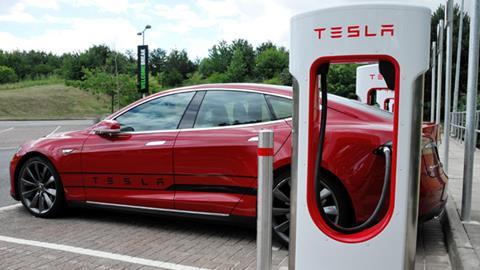
The government has reiterated its plan to phase out the sale of all petrol and diesel cars by 2030 and all non-zero emission (tailpipe) cars by 2035, and has no plans to follow the EU in allowing cars that run on e-fuels.
The reaffirmation of its plans was contained in its Zero Emission Vehicle Mandate which it has put out for consultation.
Asked about the EU decision to allow the sale of new internal combustion engine (ICE) cars that run on e-fuels after all other new ICE cars are banned in 2035, a Department for Transport (DfT) spokesperson said: “E-fuels are not proven technology, have expensive and complex supply chains, and emit much of the same pollutants as petrol and diesel.
“They might have a role for specialist vehicles, but we are not looking at them as a solution for normal cars and vans.”
The document defines a Zero Emission Vehicle (ZEV) as one that “must emit no CO2 or any other targeted greenhouse gases at the exhaust and have a minimum range of at least 120 miles (WLTP)”.
The ZEV mandate stipulates that vehicle manufacturers will have to sell a rising proportion of electric vehicles (EVs) in the lead up to 2030, beginning in 2024.
The proposed minimum ZEV target for new cars sold by manufacturers begins at 22% in 2024, increasing to 80% in 2030 reaching 100% in 2035. The proposed minimum ZEV target trajectory for new vans sold begins at 10% in 2024 and reaches 70% in 2030 on the way to 100% in 2035.
If manufacturers exceed their ZEV targets, excess ZEV mandate (ZEVM) allowances may be traded to other manufacturers for any price. Manufacturers that don’t meet their targets will be issued with fines, suggested to be £15,000 per car.
Exemptions from the ZEV mandate requirements will apply until 2029 for manufacturers selling less than 2,500 cars or vans per annum.
Commenting on the announcement of the ZEV mandate consultation, Zemo’s CEO Andy Eastlake said: “Working together we have eight weeks to get the ‘Devils out of the detail’ to deliver a world-beating ZEV mandate and put the UK on a clear trajectory to phase out all emitting vehicles by 2035.”
The Society of Motor Manufacturers and Traders (SMMT) welcomed the consultation but was highly critical of the way the government is managing the transition to zero-emission vehicles.
SMMT chief executive Mike Hawes said: “Automotive is on track to deliver zero-emission motoring, so we welcome this long-awaited consultation on a watershed regulation for the UK new car and van market. We want regulation that gives consumers choice and affordability, and enables manufacturers to transition sustainably and competitively.
“While the proposals rightly reflect the sector’s diversity, late publication and lack of regulatory certainty make product planning near impossible, and the continued lack of clarity as to what technologies will be permitted beyond 2030 undermines attempts to secure investment.”
“The UK new car and van market is already moving at pace towards electrification, the result of massive investment by manufacturers and increased consumer demand. If the UK is to lead the global race to zero emission mobility, however, it must go further and faster in unlocking infrastructure investment, incentivising EV ownership and helping ensure more of these vehicles are developed and built in Britain.”
BVRLA (British Vehicle Rental & Leasing Association) chief executive, and Zemo Board member, Gerry Keaney, said: “The ZEV mandate is a critical tool in the UK meeting its ambitious Net Zero targets. The clarity given today will give fleets and motorists the confidence to continue their decarbonisation journey and accelerate the transition to zero emission transport.
“BEV demand is growing – driven by company car fleets – where over 50% of new registrations are electric. We now need supply to keep pace by providing a wider range of vehicles at all price points. The ZEV mandate will help to ensure the right vehicles are coming to the UK, allowing more drivers to make a swift switch to electric.”
Guy Spence, managing director of LV= ElectriX, commented: “As ever, the devil is in the detail – it’s essential that the plans are bold enough and there aren’t any loopholes that may jeopardise results. If done right, the Zero Emission Vehicle Mandate will help us reach price parity of electric vehicles with petrol and diesel cars sooner.
“It should also increase the makes and models of electric cars available and will have the longer-term benefit of a more buoyant second-hand market for electric cars, making EVs more affordable across our communities. In parallel, we must also accelerate rollout of reliable charging infrastructure that is easy to use, safe and accessible.”
































